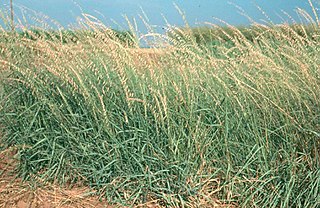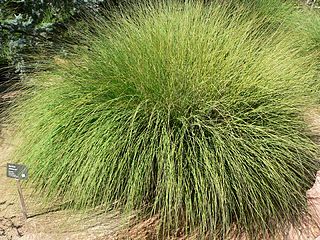
Pennisetum is a widespread genus of plants in the grass family, native to tropical and warm temperate regions of the world. They are known commonly as fountaingrasses. Pennisetum is considered a synonym of Cenchrus in Kew's Plants of the World Online.

Panicum (panicgrass) is a large genus of about 450 species of Poaceae grasses native throughout the tropical regions of the world, with a few species extending into the northern temperate zone. They are often large, annual or perennial grasses, growing to 1–3 m (3–10 ft) tall.

Foxtail millet, scientific name Setaria italica, is an annual grass grown for human food. It is the second-most widely planted species of millet, and the most grown millet species in Asia. The oldest evidence of foxtail millet cultivation was found along the ancient course of the Yellow River in Cishan, China, carbon dated to be from around 8,000 years before present. Foxtail millet has also been grown in India since antiquity.

Echinochloa is a very widespread genus of plants in the grass family and tribe Paniceae. Some of the species are known by the common names barnyard grass or cockspur grass.

Bouteloua is a genus of plants in the grass family. Members of the genus are commonly known as grama grass.

Albert Spear Hitchcock was an American botanist and agrostologist.

Muhlenbergia is a genus of plants in the grass family.

Setaria is a widespread genus of plants in the grass family. The name is derived from the Latin word seta, meaning "bristle" or "hair", which refers to the bristly spikelets.

Sporobolus is a nearly cosmopolitan genus of plants in the grass family. The name Sporobolus means "seed-thrower", and is derived from Ancient Greek word σπόρος (spóros), meaning "seed", and the root of βάλλειν (bállein) "to throw", referring to the dispersion of seeds. Members of the genus are usually called dropseeds or sacaton grasses. They are typical prairie and savanna plants, occurring in other types of open habitat in warmer climates. At least one species is threatened with extinction, and another is extinct.

Calamovilfa is a genus of North American plants in the grass family native to the United States and Canada.
Chamaeraphis is a genus of Australian plants in the grass family. The only recognized species is Chamaeraphis hordeacea, found in Queensland and Northern Territory.

Sphenopholis is a genus of North American and Hawaiian plants in the grass family.

Hilaria is a genus of North American plants in the grass family. Members of the genus are commonly known as curly mesquite. They are found in the Southwestern United States, Mexico, and Guatemala.
Ixophorus is a genus of Latin American plants in the grass family. The only recognized species is Ixophorus unisetus. Some authors have included one or two other species in the genus, such as I. pringlei, but these have more recently been reduced to synonymy. Common names for I. unisetus include crane grass, turkey grass, Honduras grass, Mexican grass, Central America grass, hático (Colombia), zacate blanco, and zacate chompipe (Nicaragua).

Jouvea is a Latin American genus of coastal plants in the grass family. It grows on mud flats and coastal sand dunes from northern Mexico to Ecuador.

Setaria verticillata is a species of grass known by the common names hooked bristlegrass, rough bristle-grass and bristly foxtail. It is native to Europe, but it is known on most continents as an introduced species and often a noxious weed. It is a hardy bunchgrass which grows in many types of urban, cultivated, and disturbed habitat. It is a weed of many types of agricultural crops, growing in vineyards and fields. Herbicide-resistant strains have been noted.

Setaria viridis is a species of grass known by many common names, including green foxtail, green bristlegrass, and wild foxtail millet. It is sometimes considered a subspecies of Setaria italica. It is native to Eurasia, but it is known on most continents as an introduced species and is closely related to Setaria faberi, a noxious weed. It is a hardy grass which grows in many types of urban, cultivated, and disturbed habitat, including vacant lots, sidewalks, railroads, lawns, and at the margins of fields. It is the wild antecedent of the crop foxtail millet.
Frank Lamson-Scribner was an American botanist and pioneering plant pathologist. He was the first United States Department of Agriculture (USDA) scientist hired to study plant disease in economic plants and first USDA agrostologist.















